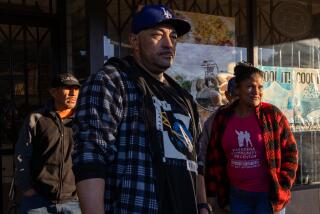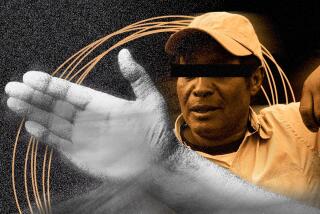Taunters of Migrant Portrayed as Vigilantes
- Share via
Two workers at Carlsbad’s Country Store were characterized Tuesday as vigilantes who, by tying up and placing a paper bag over the head of a migrant worker, were crafting a “human scarecrow” to frighten away other migrants who congregate around the store.
By their actions, defendants Randy Ryberg and William Zimmerman were embarking on their own form of “vigilante justice--or injustice” that effectively deprived a 27-year-old Mexican of his liberty, Deputy Dist. Atty. George McFetridge told a Vista Superior Court jury during his closing arguments.
“In the United States,” McFetridge said, “everyone has rights. Foreigners have rights in this country. The defendants flagrantly violated those rights. They arrested, tried and convicted Mr. (Candido) Gayosso all on their own. What they did to Mr. Gayosso they wouldn’t have done to a white American.”
McFetridge told the jurors that, even if Gayosso was trespassing on their property, and even if he was legally put under citizen’s arrest, the two defendants still went too far when they first handcuffed him to a stair railing, then bound him with silver duct tape and placed a bag over his head that featured a scrawled depiction of a clown face and the words, “No Mas Aqui,” Spanish for “no more here.”
Gayosso was then led to an adjacent field, where he was eventually freed by a Carlsbad police officer who had been called to the scene by other migrant workers.
The case is symbolic of the growing friction between North County businessmen and the hundreds of migrant workers who appear each morning from their makeshift camps and solicit work along busy streets and in parking lots.
McFetridge argued that it was not unlawful for Gayosso to have been in the Country Store parking lot on Jan. 3, soliciting day labor work, because the store’s parking lot is a public place. Moreover, the prosecutor said, the defendants failed to convey to Gayosso the offense for which they were accusing him--trespassing--and to give him a chance to leave.
“Mr. Gayosso never knew what hit him,” McFetridge said of the confrontation. “Did Mr. Gayosso even know what their beef was? To take away someone’s freedom is a crime. It’s a big deal. If you’re going to do it, you better do it right. They blew it. They botched it.”
McFetridge said racism was not an issue in the trial, “so it’s not appropriate to wonder whether some matron from Rancho Santa Fe would be treated the same way.”
Referring to the scores of migrant laborers who regularly patronize the rural market, the prosecutor sardonically added that Ryberg and Zimmerman “want the migrants’ money, but not their presence. They’ve given new meaning to ‘fast food’: Buy it, and be movin’ on.”
“They used Mr. Gayosso as a human scarecrow, as a warning to the other migrants, that you’d better not be messing around with the Rybergs,” said McFetridge, referring to Randy Ryberg--who is a baker at the store, and his brother, Rick Ryberg, who owns the store but was not charged.
Randy Ryberg’s attorney, Lynn Behymer, conceded to the jury that his client was guilty of a crime for having taped and bagged Gayosso--but said the transgression fell short of the felony charge of false imprisonment by excessive force.
“It probably is a crime, but the appropriate crime for that kind of conduct is the crime of battery,” Behymer said.
“There are other ways for him to be punished,” Behymer said, alluding to a civil lawsuit that already has been filed against Ryberg on behalf of Gayosso. “There’s a hidden agenda here. He (Gayosso) has filed a lawsuit. He’s got himself an attorney. He’s been taken control of by other people who want to make this a bigger thing than it is.”
Behymer said Ryberg did his best to make a lawful citizen’s arrest, based on the belief that Gayosso was trespassing and diverting possible business from the store because of his attempts to wave down passing motorists for work.
Behymer scoffed at the notion that Ryberg should have known the exact protocol for making a citizen’s arrest. “Nobody expects the average citizen or shopkeeper to memorize the code,” Behymer said, holding up the penal code for the jury to see. “That doesn’t mean that, if he misses (the legal protocol) a little, we lock him up and accuse him of a felony.”
Robert James, the attorney for Zimmerman, who is a butcher at the store, said his client shouldn’t be convicted because he was neither a menace nor was violent when he assisted Ryberg, but was merely at Ryberg’s side when Gayosso was turned into the field. The prosecution alleges that Zimmerman helped Ryberg bind Gayosso with the tape.
“Mr. Zimmerman had no criminal intent,” James argued. “He went out (of the store) with the purpose of releasing Mr. Gayosso. There’s not a single iota of evidence to show you that Mr. Zimmerman used any violence or was menace.”
But McFetridge countered that, when the pair led Gayosso into the field, taped and bagged, they didn’t release him at all, but merely continued his imprisonment in a different form.
“Before you go around handcuffing people and taking away their rights,” McFetridge said, “you better know the law. . . . Randy Ryberg was totally ignorant of the law, and as a result of his ignorance, Mr. Gayosso lost his freedom.”
If convicted, the two could be sentenced to a maximum of three years in prison, although McFetridge previously has said he would entertain the notion that they spend at least two hours in jail--about the same time that Gayosso was bound and bagged.
The jury deliberated briefly Tuesday afternoon, and will resume today.
More to Read
Sign up for Essential California
The most important California stories and recommendations in your inbox every morning.
You may occasionally receive promotional content from the Los Angeles Times.










